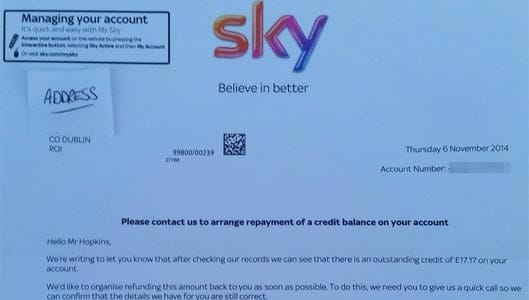Sky credit repayment letter warnings
A warning depicting a letter from Internet Service Provider Sky is floating around social media claiming that the letter is a scam designed to lure victims into calling a number where they will be scammed.
The letter, that is titled “Please contact us to arrange repayment of a credit balance on your account” asks the reader to call 08081 01 44 37 to claim their credit – however the warning attached to the message reads “If you get this letter don’t ring the number. IT WILL COST YOU”.
Scams that lure victims into calling premium numbers, or numbers that try and extract sensitive information from you are real threats, and sometimes scammers will pretend to represent businesses like Sky in order to get this information, so it is right to be wary of letters like this.
However in this case the letter is actually genuine. Providing the number attached to the letter is 08081 01 44 37, then it isn’t a scam. Numbers in the UK that begin with 0808 are Freephone numbers, and a later statement from Sky themselves have confirmed the letter is genuine.
From Sky –
Those who call the number of prompted to enter their SKY account number and phone number.
The letters were the result of an “administrative blunder” that resulted in many customers pre-2012 not getting money in their Sky accounts returned to them. Most reported refunds were small, under £10, and the time it’s taken Sky to sort out the error means that many customers have since moved away, resulting in non-Sky customers getting their mail instead.
With that said, you should always be cautious when getting mail like this, because it is not always genuine. With that said it is unusual [though certainly not impossible] for scam letters like this to be addressed to a customer personally – often scam letters start with the generic “Dear customer” to remove the need for the scammer to find out who lives at the address.
If you ever get a letter in the post and you’re not sure its genuine, proceed with caution and always ask someone before giving away any information or trying to call any number.
Continued below...
Thanks for reading, we hope this article helped, but before you leave us for greener pastures, please help us out.
We're hoping to be totally ad-free by 2025 - after all, no one likes online adverts, and all they do is get in the way and slow everything down. But of course we still have fees and costs to pay, so please, please consider becoming a Facebook supporter! It costs only 0.99p (~$1.30) a month (you can stop at any time) and ensures we can still keep posting Cybersecurity themed content to help keep our communities safe and scam-free. You can subscribe here
Remember, we're active on social media - so follow us on Facebook, Bluesky, Instagram and X
